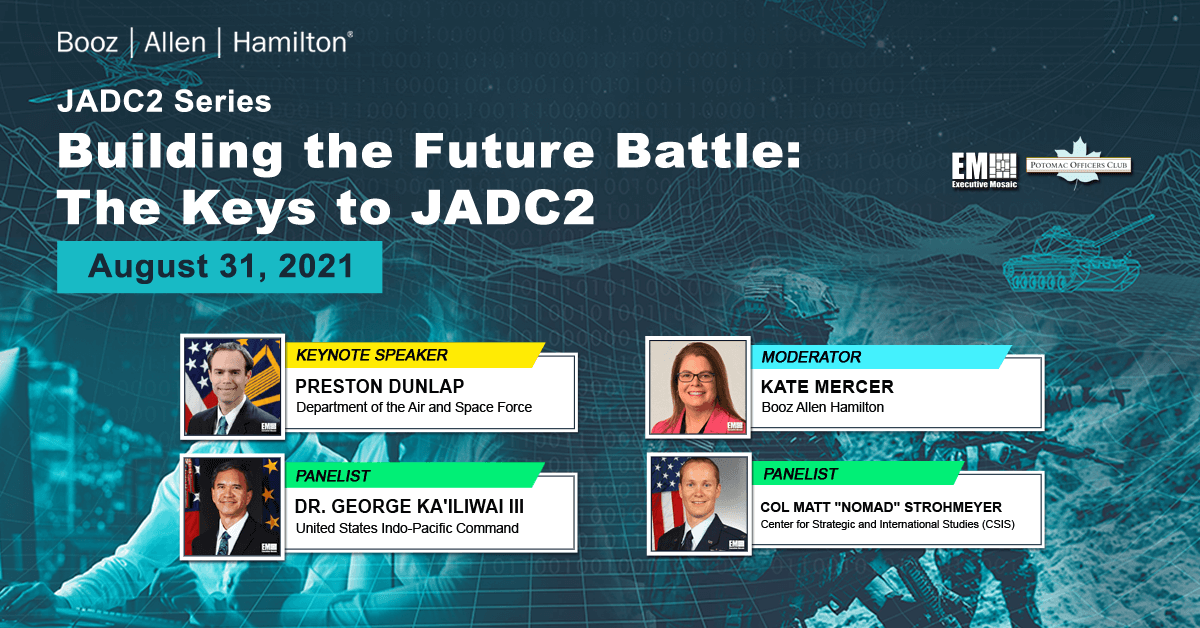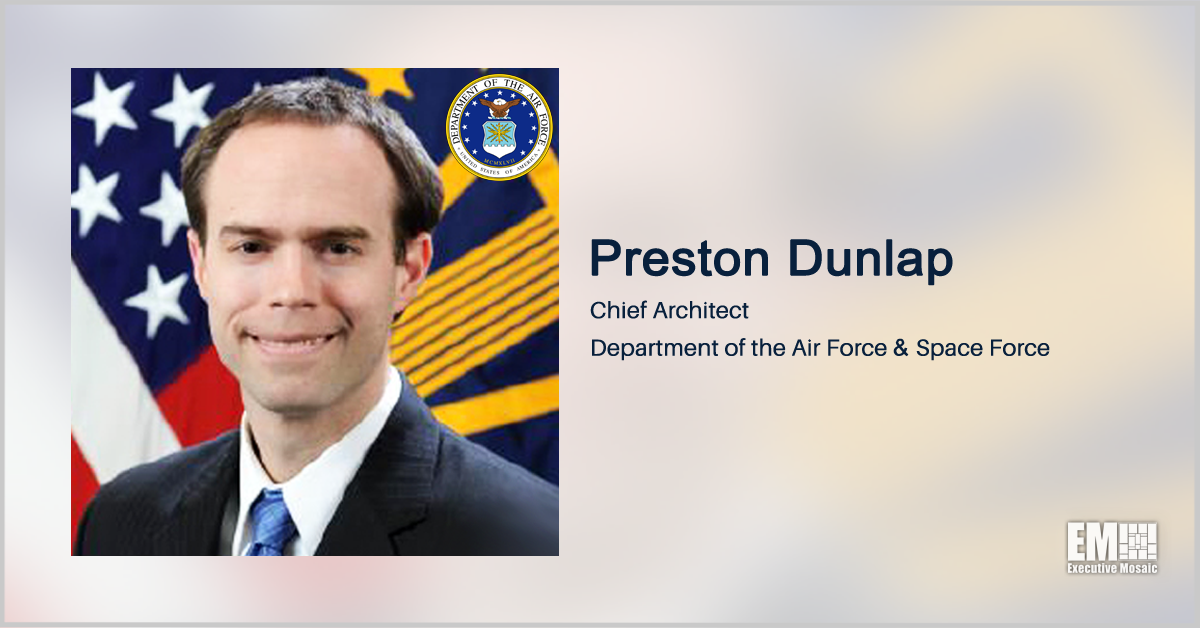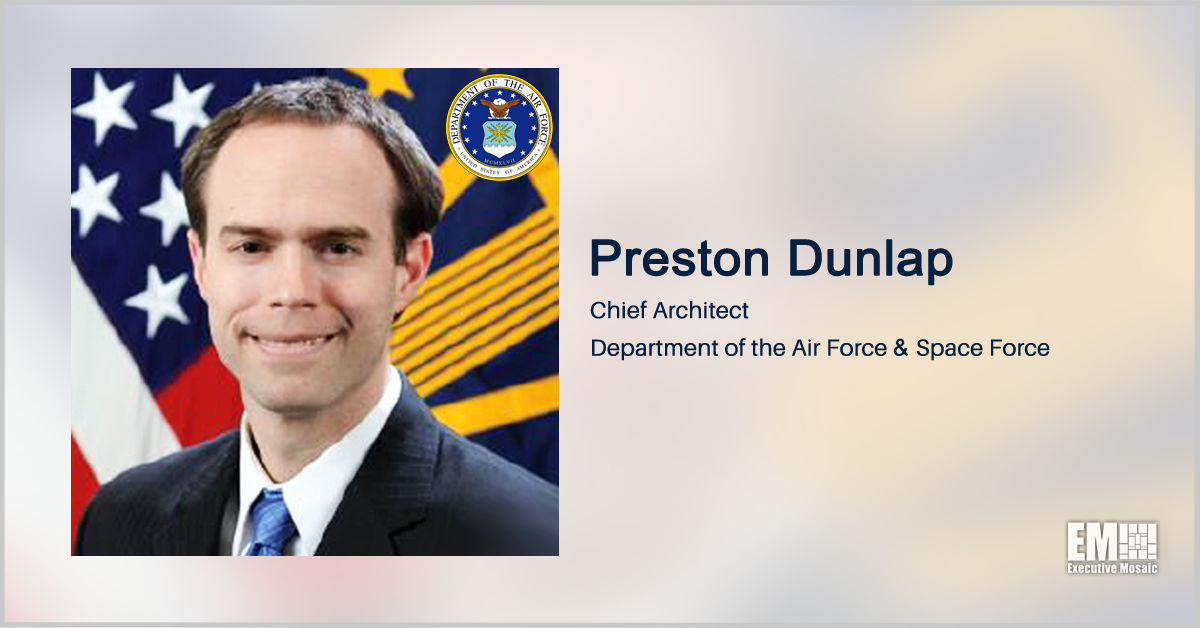Potomac Officers Club (POC) hosted its Building the Future Battle: The Keys to JADC2 on Tuesday to showcase the key executives’ efforts as they work to develop the first phase of Joint All-Domain Command and Control (JADC2) and address the speed and timing challenges of technology development for our military branches and systems.
Following an opening keynote address from Department of the Air Force Chief Architect Preston Dunlap, POC’s latest virtual event continued with its full panel discussion with the Forum’s moderator Kate Mercer, a vice president of Booz Allen Hamilton.
The expert panel discussion featuring George Ka’iliwai III and Col. Matt “Nomad” Strohmeyer as panelists to discuss the most significant challenges the federal government and U.S. military branches are facing as they work to develop the fundamental principles and necessary solutions for JADC2 implementation.
Check out the Potomac Officers Club’s Event Page to rewatch Building the Future Battle: The Keys to JADC2 on-demand and any other of POC’s forums that you may have missed recently.
Kate Mercer provided the introduction for each executive as the panel discussion began. Both were given the chance to share their remarks on the hurdles surrounding JADC2 implementation.
George Ka’iliwai III, director of Requirements and Resources (J8), Headquarters for the U.S. Indo Pacific Command (HQ USINDOPACOM), took the platform first and highlighted the separation that exists with more capabilities being developed separately rather than together.
“From my perspective, I see a lot of the services that are working very hard within their service-centric silos and accomplishing tremendous things. The problem is they’re being done separately,” Ka’iliwai explained.
“The U.S. Army is working on Project Convergence. The Navy is developing Project Overmatch and the Air Force as Advanced Battle Management System. The question is how are all of these silos and projects going to connect,” he asked. “I think the jury is still out on that right now. It’ll take some time, but I do think we’re making tremendous progress.”
After George Ka’iliwai’s comments, Col Matt “Nomad” Strohmeyer, military fellow for the Center for Strategic and International Studies (CSIS), had the chance to address the current set of challenges in this area.
Col. Strohmeyer agreed with his fellow panelist’s opinion that there has been a lot of separate, yet outstanding work being done and there hasn’t been a united vision to bring it all together. He also emphasized another challenge surrounding our relationship with risk and how our collective mentality about risk versus reward in our capabilities development needs to change as well.
“As someone who has been in the military for more than twenty years, I’ve seen firsthand how we often think about risk in terms of, ‘How can we avoid unnecessary risks at all costs?’ The issue is that creates and leads to a ‘risk-averse culture’ and a general unwillingness to try bigger ideas despite the best intentions,” Col. Strohmeyer explained.
“What we’ve tried to do is take an approach of actively seeking out prudent risks as a means to be able to seize initiatives and looking for opportunities with proven risks,” he continued. “That willingness to think about risk differently, I think significantly helped us to quickly develop capabilities, but also meant that we needed to think differently about how we go about developing those capabilities as well.”
Visit the Potomac Officers Club’s Event Page to hear the full keynote address from Preston Dunlap and the full panel discussion between Col. Nomad Strohmeyer and George Ka’iliwai.

On Sept. 14th, Potomac Officers Club will host its Bolstering Climate Resilience for National Security Forum featuring Senior Climate Advisor for the Office of the Secretary of Defense Joseph Bryan as the opening keynote speaker.
Ecological Futures Group Founder and CEO Dr. Rod Schoonover will join Bryan as the closing keynote speaker as both execs discuss the challenges that climate change presents to U.S. supply chains, military readiness and our federal infrastructure as a whole.
Visit PotomacOfficersClub.com to register for the platform’s Bolstering Climate Resilience for National Security Forum to learn more about the impact climate change is having on the federal landscape and U.S. national security.
Thank you for your continued support of the Potomac Officers Club and we hope to see you at the Bolstering Climate Resilience for National Security Forum on Sept. 14th.






